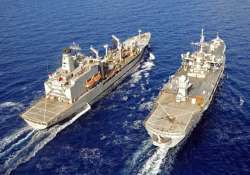US Navy develops technology to turn seawater into fuel
Washington: Researchers at the U.S. Naval Research Laboratory have now proven that it's possible to power engines instead with a cheap, convenient supply of fuel: seawater.Though it will take another 10 years before ships will

Washington: Researchers at the U.S. Naval Research Laboratory have now proven that it's possible to power engines instead with a cheap, convenient supply of fuel: seawater.
Though it will take another 10 years before ships will likely be able to successfully convert seawater into super-powerful fuel, but the technology is already being hailed as a game changer and is expected to substantially cut costs for the Pentagon.
This new method will turn ordinary seawater into a liquid hydrocarbon fuel potent enough to power a small model aircraft and Navy ships.
The process at hand involves extracting carbon dioxide molecules from the ocean water outside of a ship's hull and using it to produce hydrogen gas, “catalytically converting the CO2 and H2 into jet fuel by a gas-to-liquids process.”
This development is being hailed as a game changer. If Navy ships create their own fuel they can remain operational 100 percent of the time, rather than conducting frequent fuel-ups with tankers while at sea, which can be tricky in rough weather.
Though it will take another 10 years before ships will likely be able to successfully convert seawater into super-powerful fuel, but the technology is already being hailed as a game changer and is expected to substantially cut costs for the Pentagon.
This new method will turn ordinary seawater into a liquid hydrocarbon fuel potent enough to power a small model aircraft and Navy ships.
The process at hand involves extracting carbon dioxide molecules from the ocean water outside of a ship's hull and using it to produce hydrogen gas, “catalytically converting the CO2 and H2 into jet fuel by a gas-to-liquids process.”
This development is being hailed as a game changer. If Navy ships create their own fuel they can remain operational 100 percent of the time, rather than conducting frequent fuel-ups with tankers while at sea, which can be tricky in rough weather.